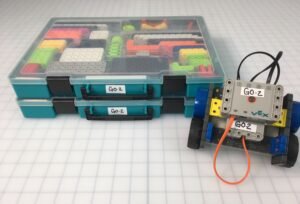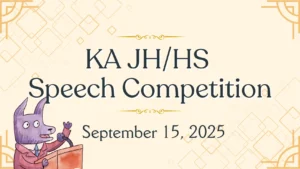Enjoy this short video snippet about Kyoto International School from our 2025 Fall Osaka Expo.
Transcript
We spoke with Matt Topliss (Principal).
ISTimes Global (00:02): Hi, this is the International School Times Global at the Osaka International Education Expo. I’m here with Matt. Matt, could you introduce yourself, please?
Kyoto International School (Matt) (00:12): Yes, my name’s Matt Toplis. I am the principal at Kyoto International School. Uh we are an IB uh continuum school K to 12 in the heart of Kyoto in Japan.
Academics
ISTimes Global (00:22): Great. Um could you tell us a little bit about academics at your school?
Kyoto International School (Matt) (00:27): So yeah, we we are a an IB continuum school as I’ve said, so we are very much uh about the inquiry-based learning. We’ve added in um a British style curriculum alongside the IB program. So we would run uh the IB PYP, the IBMYP, and then the diploma now through to high school, which then gives us a a real uh I suppose pathway through to universities, both in Japan and worldwide as well. As I said, it’s an inquiry-based learning, but it has the rigor of um I suppose sort of foundational skills. Uh we are very strong I think in our in our language and literacy development, and our mathematics development. And increasingly now through new facility design around sort of science, technology, uh and that sort of, I suppose that STEM development as well. Um being an IB school, we’re holistic in in what we can achieve and what we can do. So our creatives are very important to us as well. So our PHE, so physical and health education, our visual and performing arts have a quite a strong role to play within our school as well. And we’re very traditional I suppose in terms of the perhaps the more pastoral elements as well around house system, uh and around school identity and individual identity within our school as well.
School Culture
ISTimes Global (01:43): Wonderful. Um speaking of a house system, can you tell us a little more about your school’s culture?
Kyoto International School (Matt) (01:49): Yeah, I mean I I culture is really important to to any school. I I do a lot of leadership development work as well with other leaders, and that is a a key part of leadership development as well. So our culture, I think is one uh that embraces the individuality. We are though a mainstream school with high expectations for the young people within our school. We clearly communicate that to to them and to parents as well. And it’s an understood culture of I think everybody understands where we’re going and why we’re going in that direction and the part that they’re going to play within that as well. So we are that culture of high expectations and we do, I think see that on a day-to-day hour by hour basis from the young people within our school as well. And they very clearly understand the reasons for that. I think around the safety, around the the expectations that that we would have consistency. There’s a respect to to to what we achieve within our school as well. And it’s a very caring uh and collaborative environment that we that we play through on a daily basis. Um parents are very responsive to this, uh and the young people I think are seeing uh that that their their skill set now, but also we have a responsibility to equip them when they go out into society as well. So not only through qualification, but through elements of the IB learner profile that will make a difference to them when they go out and interact and they can articulate themselves in the wider world.
Future Memories
ISTimes Global (03:16): Sounds great. Speaking of going out into the wider world, as your children graduate, what are some of the memories that you’d like them to take away from their time at your school?
Kyoto International School (Matt) (03:25): Well, I think we’re back to those those high expectations. I it’s very interesting that we’ve just put ourselves in for a couple of uh awards, international school awards. And when you start to to to ask children for testimonials, they talk about I think uh an an energy to our school. They talk about a progression to their learning and the and the development of themselves, but in a, in a very sort of self-evaluatory way as well. And that’s I think really crucial to us for for young people to understand themselves really clearly. And we do that through a variety I think of of both academic and pastoral opportunities. So, uh trips and visits, um on a day trip basis or over a week as we just taken our secondary school students out. Um cultural exchanges with with local Japanese schools, with other international Japanese international schools as well. Uh we have two partner schools in China and students have gone there and had those experiences. But I think the the main one is centered around high-quality learning on a daily basis and the ability I think for our children to to understand themselves, to understand their strengths and areas for development, and to take themselves further forward on a daily basis. It’s a very happy place, uh but it’s a happy place I think because of those expectations of the consistency and everybody is sure of what they’re trying to achieve and the part that they’re playing in that development as well.
ISTimes Global (04:49): This is great. Thank you so much for your time, Matt.
Kyoto International School (Matt) (04:51): Thank you. Thank you for the chance. Thank you.

About Kyoto International School
- IB continuum school (PYP, MYP, Diploma) in central Kyoto
- British-style academics combined with inquiry-based learning
- Strong focus on language, literacy, and mathematics
- Expanding STEM and creative learning facilities
- Holistic education blending academics and the arts
- Emphasis on personal identity and house system tradition
- Culture of high expectations and student self-awareness
- Collaborative, caring, and safe school environment
- Global perspective with local and international exchanges
- Partnerships with schools in Japan and China
- Encourages reflection, leadership, and lifelong learning
- A “happy place” where purpose meets progress







